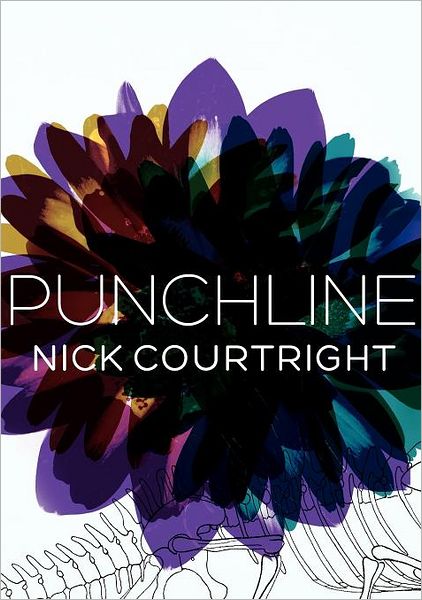Book Review
 Punchline, Nick Courtright’s stunning first collection of poems, invokes the everyday as a point of entry to compelling philosophical questions: Can sensory perception be trusted? How often are we misled by the way things appear in the world? To what extent does order exist in the chaos that surrounds us? Courtright explores possible answers to these questions in Punchline, offering readers a graceful matching of style and content. Similar to the way mundane objects lead the poet to compelling philosophical observations, the book strikes a delicate balance between image and abstraction. The end result is a collection as visceral as it is cerebral.
Punchline, Nick Courtright’s stunning first collection of poems, invokes the everyday as a point of entry to compelling philosophical questions: Can sensory perception be trusted? How often are we misled by the way things appear in the world? To what extent does order exist in the chaos that surrounds us? Courtright explores possible answers to these questions in Punchline, offering readers a graceful matching of style and content. Similar to the way mundane objects lead the poet to compelling philosophical observations, the book strikes a delicate balance between image and abstraction. The end result is a collection as visceral as it is cerebral.
As Courtright transitions between the phenomena of everyday life and more ethereal subject matter, these two discourses complicate each another in fascinating ways. The carefully chosen images in Punchline often serve as counterpoints to the common metaphysical claims echoed in the book. Through this novel pairing, Courtright suggests that, given the instability of the world around us, philosophical knowledge remains inherently changeable. Consider “Fun with Agnosticism”:
Let’s let us believe
it’s not a mystery but only probability,and all the ratios are undefined. Pull down the blinds
and be the darknessyou wish to see in the world . . .
Here Courtright begins by echoing a common assumption on the part of philosophers: given the proper amount of evidence, one may attain objective knowledge about one’s world. By pairing this claim with the image of an individual “pulling down the blinds,” the poem suggests the inevitability of one’s subjective desires intruding on this search for truth. Punchline is filled with finely crafted poems like this one, in which tangible images illuminate and complicate insightful philosophical discussions.
Along these lines, Courtright subtly parodies the idea that objective knowledge can be easily attained, an assumption that pervades much of contemporary analytic philosophy. His transitions from image to abstraction prove both ironic and unexpected, offering the reader more than a simple matching of tangible imagery and theoretical concepts. Indeed, Courtright invokes the poetic image as a means by which to respond to, and skillfully critique, contemporary philosophical discourse. He writes in “What We Know and What We Don’t”:
The ceiling fan whose arms
are shifting ghosts
of wind,or the litany of constellations
whispering down to the hood of a car on which two teens
lay—they are not as solid as you think they are
and neither are you.
In poems like this, Courtright suggests the instability of the world around us and, as a result, our knowledge of the world. The “ceiling fan” and its “shifting” arms, the “litany of constellations,” and “the hood of the car” ultimately embody Courtright’s vision of our surroundings as inherently changeable. By using concrete images to convey this perspective, the poet ultimately presents the reader with tangible evidence that remains absent from many theoretical investigations. Indeed, his use of the poetic image to lend credence to philosophical claims seems at once ironic and refreshing. Much like the collection as a whole, “What We Know and What We Don’t” exudes a sense of humility with respect to its metaphysical claims while dazzling the reader with its expert craftsmanship and adeptly chosen imagistic motifs.
Lastly, Courtright’s use of enjambment in Punchline proves at once novel and fitting. Throughout the book, the line differentiates modes of thinking about the world. As the book unfolds, noumena and phenomena are set in stark opposition to each other, resulting in a graceful synthesis of these opposing discourses. In “Consolation Prize,” for example, Courtright elaborates:
The moon would be within a step
if we were eighty trillion times the size we are, just like Florida
is far from Cuba for the man who swims there.After the flood we’ll all be heroes, if we’re left.
The new survival of the fittest . . .
Courtright places direct observations of phenomena like “Florida / is far from Cuba for the man who swims there” alongside inferences such as “the moon would be within a step” and other less tangible ideas about the world, including “the new survival of the fittest.” In doing so, Courtright suggests that these different discourses prove complementary. Just as theoretical speculation cannot exist without everyday things, the most unremarkable objects often hold the answers to metaphysical questions. Like many of Courtright’s poems, “Consolation Prize” allows different ways of understanding the world to exist gracefully within the same narrative space, illuminating and complicating one another all the while.
In short, Punchline is a truly spectacular debut. Ideal for readers interested in poetry, philosophy, or a synthesis of the two, Courtright’s new collection is as finely crafted as it is insightful.